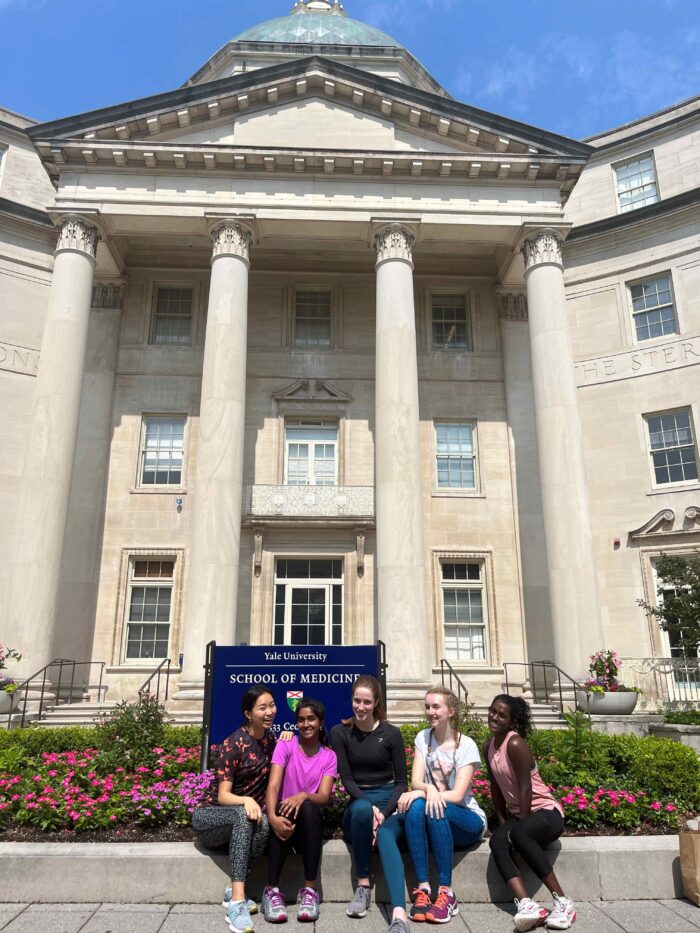My summer at Yale: Trinity Hall international collaboration restarts
Undergraduate medic Kujani Wanniarachchi spent the summer of 2023 participating in Trinity Hall’s Cambridge-Yale medical student research programme. Put on hold by Covid, the scheme has now resumed, and it offered those who took part an invaluable glimpse into research and life “across the pond.” Below Kujani reflects upon her experiences at New Haven Hospital and her time at Yale University.
“Thanks to the Cambridge-Yale collaborative programme in translational medical research, co-directed by our director of studies Professor Bradley, we had the opportunity to undertake a 6–8-week research placement at Yale University this summer. The programme is offered to 2nd year medical students at Trinity Hall, and this year’s 3rd year students were also able to join. We were elated when the programme resumed after being on hold for 3 years (COVID!) and this summer, 7 Trinity Hall students made the journey across the Atlantic to the charming city of New Haven, Connecticut.
“After the long flight, we had the weekend to settle in before meeting our lab on Monday. We toured the Yale campus, which architecturally is not too dissimilar from Cambridge, consisting of stunning colleges and plenty of green space. Interestingly, while the buildings may appear centuries old, most were constructed in the 20th century and tricks such as pouring acid down the facade and burning hay bales on the roof were used to make them look much older!
“I undertook a 6-week placement at Dr Jane-wit’s lab, a 5-minute walk from the Yale School of Medicine. I joined a team of two postdocs and two Yale undergraduate interns who were all incredibly welcoming. Dr. Jane-wit’s lab is interested in transplant rejection, the process by which the host’s immune system attacks the transplanted organ, constituting the greatest challenge to transplant longevity. Supervised by Dr Jane-wit, my project centred around understanding one specific pathway involved curiously called the hedgehog signalling pathway, named so because fruit flies that lack this gene supposedly resemble hedgehogs!

“T cells are an important component of our immune system and are involved in aiding antibody production (this is how we remember an infection the second time around) and kill infected cells. Importantly, T cells typically migrate to immune hubs in our bodies, called lymph nodes; however, previous work by the Jane-wit lab has shown that hedgehog signalling can cause a T cell subset to home to inflamed peripheral tissue, in this case, the transplanted organ. These aberrantly migrating T cells are of particular interest to researchers as preventing their migration could pose a novel therapeutic avenue to reduce organ inflammation. My project looked at the way in which hedgehog signalling modifies gene expression in T cells, which may lead to the different migration patterns. I used techniques such as the western blot (detects proteins of interest) and siRNA knockdowns (prevents the protein from a particular gene from being produced) and presented my results in the final lab meeting.
“My peers undertook equally fascinating projects. For example, Sofia’s project centred around factors that alter the efficacy of a cutting-edge cancer treatment called CAR T cell therapy, which uses the patient’s immune system to fight the cancer. Elena tested the effects of various cancer drugs on the growth of T cells and Rosia looked at repurposing drugs for the treatment of lymphomas (cancer of the lymphatic system). Jyo also looked at transplant rejection and her project focused on the inflammatory chemical, interleukin-15.
“I also had the opportunity to gain some shadowing experience at Yale-New Haven Hospital with Professor Tomayko, a dermatology physician-scientist specialising in immune-mediated skin disease. I joined her team for ward rounds and saw cases of autoimmune blistering disorders and a memorable case of Steven-Johnson’s syndrome, a particularly severe skin disorder following a reaction to medication.
“As well as the lab, we made the most of being in the US. We tried the famous New Haven pizza and hiked up East Rock and saw the fireworks for the 4th of July celebrations. We travelled to Boston and toured Harvard, made several trips to explore New York and even watched a baseball game in true American fashion!
“Overall, the programme was a fantastic experience to get involved in exciting research and I made some new Yale friends along the way too! I am grateful to Professor Bradley and Dr Jane-wit for making this trip possible and would highly recommend it to any current 2nd years.”
Further information
The programme was set up by Professor John Bradley and the Professor of Translational Medicine at Yale and Fellow-Commoner Dr Jordan Pober in 2003. After a three-year hiatus due to Covid restrictions, the programme has now resumed.
As part of this programme, Cambridge and Yale hold annual scientific meetings to discuss potential research collaborations. In 2024, the annual meeting will be held at Trinity Hall.
Professor John Bradley said he is delighted Kujani and her colleagues found the programme so worthwhile. It offers students the opportunity to undertake research in world leading laboratories, and experience the culture of life as a student in the US. During a recent visit to Yale, he met with Kujani’s mentors, and they were as impressed with Kujani as she was with Yale and the faculty she worked with. The programme has been running for 20 years, and it has been great to be able to resume it after the pandemic.
Professor John Bradley will be discussing the programme with 2nd year medics who may be interested in visiting Yale in 2024 during the Michaelmas term.